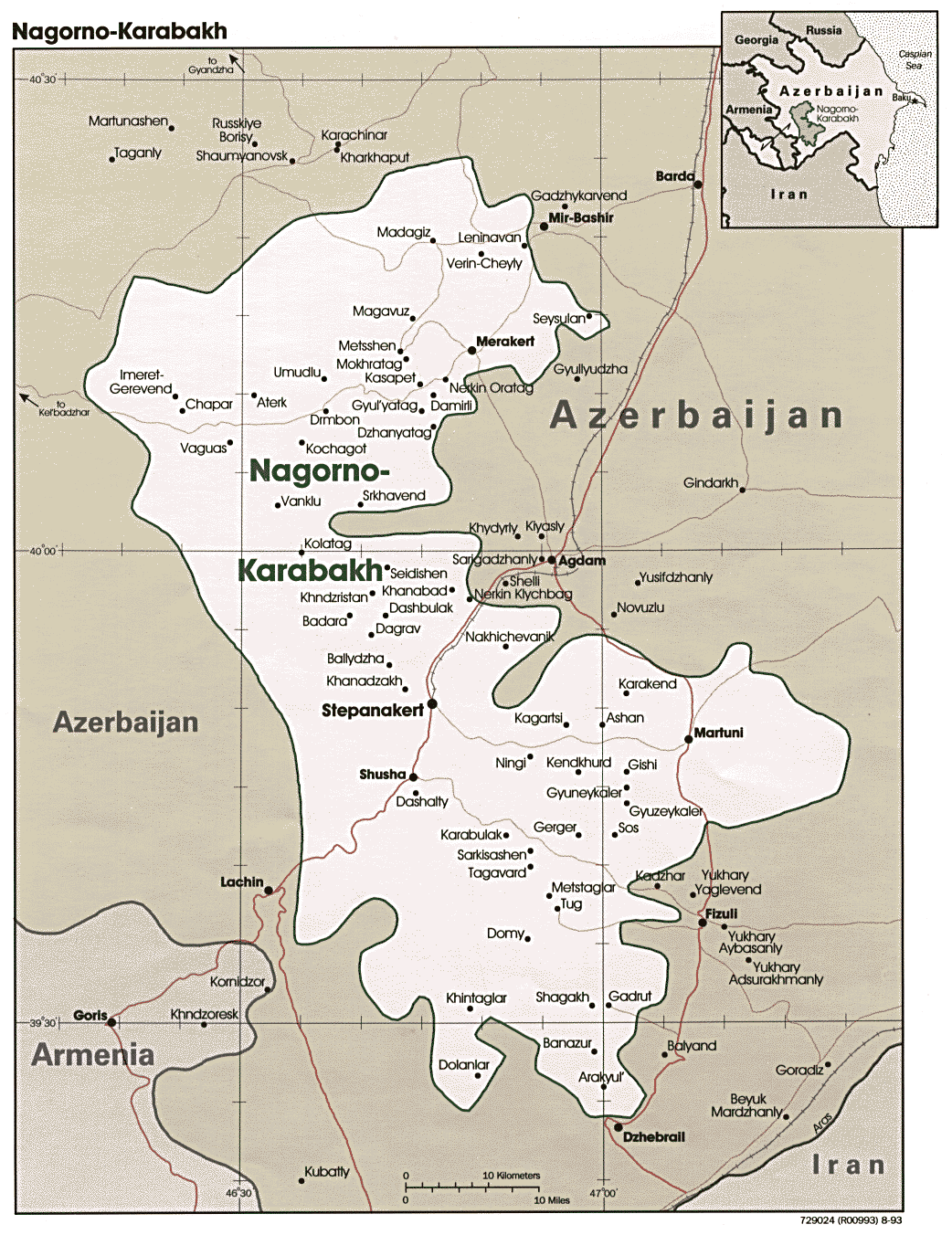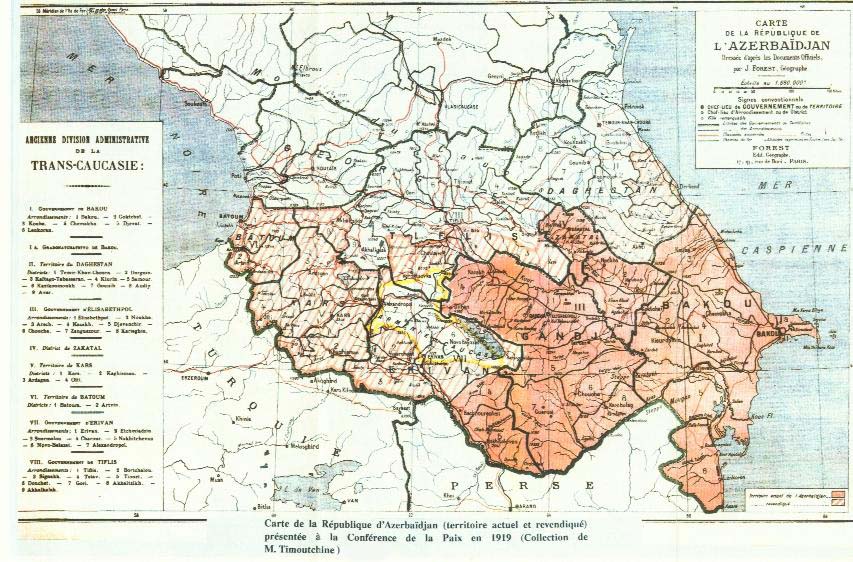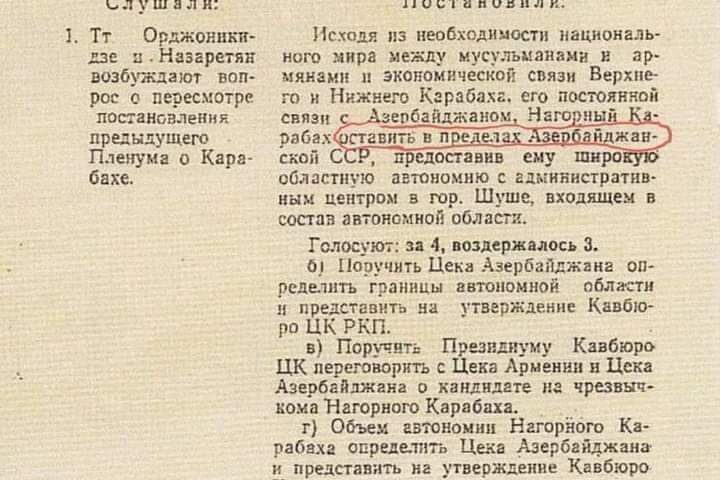As we see, difficult days had arrived for the new powers in Azerbaijan. On the one hand, giving itself over to revolutionary pathos, the Azerbaijani Soviet power considered itself close to Soviet Russia, but on the other hand, by the hands of its worker-peasant allies in Soviet Russia were being taken away lands which indisputably belonged to Azerbaijan under the earlier government. This processes continued in such an unattractive form that even Soviet workers sent from Moscow to Azerbaijan recognized the injustice of such a relationship to the republic. One of these witnesses, the chairman of the Council of the National Economy of the Azerbaijan SSR N. Solovyev, in an extensive report to V.I. Lenin noted that, “There was hope in Moscow. But the peace treaties with Georgia and Armenia, the handing over to these republics of part of Azerbaijani territory with a Muslim population, have shattered, if not absolutely killed, this hope: according to the conclusion by the Muslim masses, not only did Moscow seize Azerbaijan, but is also endowing Armenia and Georgia at its expense. The treaty with Armenia—by which part of Azerbaijani territory with exclusively Muslim population was given to Armenia, the railway which had enormous strategic and economic importance was given up, and the single corridor directly connecting Azerbaijan and Turkey was destroyed—has been received particularly badly. What is one to say to ordinary Muslims when certain members of the Azerbaijan Communist Party explain such a treaty by saying that it has been drawn up according to directives from influential Armenians in the Center who call themselves communists, but who in reality are conscious or unconscious nationalists.” [21]
Such high-handed actions by Soviet Russia in relation to Azerbaijan generated the anger of N. Narimanov. He well understood that the chief organizers of these provocative games were the Peoples Commissar of International Affairs G. Chicherin, who from the summer of 1919 had stood in opposition to the eastern policy pushed by Narimanov, and the assistant peoples commissar L. Karakhan. Both occupied leading positions, which allowed them to define and in practice to carry out the foreign and especially the Eastern policy of the Soviets. In the struggle with Chicherin, N. Narimanov viewed the intervention of Lenin as the only way out because Lenin had before Sovietization given many beautiful promises. Still believing in the justice of Lenin’s position concerning Azerbaijan, N. Narimanov in the middle of July wrote the following: “With the telegram of Comrade Chicherin, it is clear that Your information is one-sided or that the Center is being subjected to the influence of those who even now act jointly with the Denikin forces against Soviet power in Azerbaijan. If it is profitable to the Center to sacrifice Azerbaijan and to retain for itself only Baku with its oil and to stop conducting any Eastern Policy, then this can be done, but I warn: It is impossible to hold Baku without all of Azerbaijan in the neighborhood with the traitor Dashnaks and Georgian Mensheviks. On the other hand, I would like to find out how the Center view us, Muslims, and how it can resolve such important questions without us. The Center can relate to us with a lack of trust, but then even such responsible workers as Ordzhonikidze and Mdivani will not agree with such a decision. I say directly that the Center has taken the weapon from our hands and by its decisions about Karabakh and so on intensified, and provided support for, the provocation of the Musavat, which all the time insists that Muslim Communists have sold Azerbaijan to Russia, which recognizes the independence of Armenia and Georgia and, at the same time, considers for some reason the hitherto indisputable territories of Azerbaijan matters of dispute. Comrade Chicherin speaks about subordination to the policy of the center, but does the Center realize that this very same center is forcing us into an untenable position. … People here tell us directly: ‘You cannot secure for Azerbaijan completely undisputable territories, but continue talking about the liberation of the East.’” [22]
In another letter to V.I. Lenin, N. Narimanov warned about the serious danger threatening Azerbaijan: “A terrible situation is being created. The Center recognized the independence of Georgia and Armenia and recognized the independence of Azerbaijan, but at the same time, the Center is giving totally indisputable territories of Azerbaijan to Armenia. If these same territories were given to Georgia, it would be possible somehow to struggle to win over public opinion, but to give them to Armenia, this is an unjustified and fatal mistake” (Narimanov 1990, p. 117).
Despite the tough and even at times sharply oppositional position of N. Narimanov, Soviet Russia chose to prefer the policy of denigrating Azerbaijan that had been developed by the Peoples Commissariat of International Affairs. In a diplomatic dispatch sent on July 20 by G. Chicherin to N. Narimanov, there was the following sarcastic comment: “Up until now not in one telegram was clarified to us by you or Ordzhonikidze why the occupation of Karabakh and Zangazur by Russian forces does not satisfy you and other local communists and why is required their immediate annexation to Azerbaijan. … We need to develop relations with Armenia for it could happen that if Turkey turns against us, Armenia, even a Dashnak Armenia, could be an advanced post in the struggle against the attacking Turks.” [23] In another letter, G. Chicherin warned the Politburo of the Central Committee of the RCP(b) that one should approach Armenian-Azerbaijani relations by taking the position of Turkish policy into account. He wrote: “In the discussion of Armenian-Azerbaijani dispute, I have all the time indicated that in the case of a turn in Turkish policy toward the path of conquest in the Caucasus, Armenia will be a barrier against it and will defend us.” [24]
As the position of Soviet Russia in Azerbaijan strengthened, this republic was step by step transformed into an advance post for the regional policy of the Bolsheviks, and on account of its natural resources, the position of the Georgian and Armenian bourgeois republics was weakened, and favorable conditions were created for the Sovietization of Armenia. In a code cable to V.I. Lenin sent by Legran on September 23, 1920, the intentions of Soviet Russia relative to Azerbaijani territories were defined in the following way: one should not be concerned about the transfer of Zangazur and Nakhchivan to Armenia. The very thought that these territories are needed by us for liberation military operations in the Turkish and Tabriz directions is utopian. And thus it is impossible to disagree with the territorial claims of Azerbaijan. The objective and well-based support from Moscow undoubtedly will satisfy Azerbaijan. As for Karabakh, it is possible to insist on its unification with Azerbaijan. [25] In another telegram on October 24, 1920, sent to G. Chicherin, B. Legran described his agreement with Armenians concerning Azerbaijani territories in the following way: “The Armenians have made the immediate recognition of their position with regard to Nakhchivan and Zangazur a categorical condition. I indicated that without Azerbaijan, this question cannot be resolved and that only by Armenia’s dropping of claims to Karabakh could we put this before Azerbaijan. The Armenians agreed after long discussions and with inessential qualifications to withdraw as far as Karabakh is concerned.” [26] But this refusal turned out to be premature, and at the end of November 1920, with the establishment of Soviet power in Armenia, the struggle for the mountainous part of Karabakh entered a new stage.
Reference
Narimanov, Nariman (1990) K Istorii Nashey Revolyutsii v Okrainakh (Pis’mo I.V. Stalinu) [On the History of Our Revolution in the Provinces (Letter to Stalin)], Baku.
Notes
[1] “The Results of Soviet Construction in Azerbaijan,” The Report of N. Narimanov to V.I. Lenin, 15 September 1921, Russian State Archive of Social-Political History (hereafter RSASPH), f. 5, op. 1, d. 1219, l. 12; The Letter of N. Narimanov to V.I. Lenin, Political Documents Archive under the President of Azerbaijan Republic (hereafter PDA PAR), f. 609, op. 1, d. 71, l. 51.
[2] Telegram of S. Kirov to G. Chicherin, 29 June 1920, RSASPH, f. 5, op. 1, d. 2178, l. 1.
[3] Telegram of N. Narimanov, M. Mdivani, A. Mikoyan, and A. Nuridzhanyan to G. Chicherin, 19 June 1920, State Archive of Azerbaijan Republic (hereafter GA AR), f. 28, op. 1, d. 211, l. 115.
[4] Letter of Peoples Commissar of International Affairs G. Chicherin to the Politburo of the CC RCP(b), 22 June 1920, PDA PAR, f. 1, op. 1, d. 2a, l. 9.
[5] Response of G. Chicherin to a query by V. Lenin, June 1920, RSASPH, f. 2, op. 1, d. 1451, l. 1.
[6] Letter of Narimanov, Mdivani, Mikoyan, Naneyshvili, Vesnik, Levandovsky and Mikhailov to the Central Committee of the RCP(b), 10 July 1920, PDA PAR, f. 1, op. 44, d. 118, l. 25-27.
[7] Code Cable of G. Chicherin to G. Ordzhonikidze, 2 July 1920, RSASPH, f. 85, op. 3s, d. 2, l. 3.
[8] Response of G.K. Ordzhonikidze by direct line to the statement of Chicherin on 2 July concerning territories in dispute between Azerbaijan and Armenia, July 1920, RSASPH, f. 85, op. 3s, d. 2, l. 6.
[9] Reminder by Ordzhonikidze by direct line to V. Lenin, I. Stalin, and G. Chicherin, July 1920, RSASPH, f. 85, op. 3s, d. 2, l. 8-9.
[10] Telegram of G. Ordzhonikidze to G. Chicherin, 1920, RSASPH, f. 64, op. 1, d. 17, l. 53.
[11] Note by direct line to Allilueva, 7 July 1920, RSASPH, f. 85, op. 3s, d. 2, l. 20.
[12] Telegram of G. Chicherin to G. Ordzhonikidze, 8 July 1920, RSASPH, f. 64, op. 1, d. 17, l. 60.
[13] Telegram of G. Ordzhonikidze to V.I. Lenin, I.V. Stalin and G.K. Chicherin, 16 July 1920, RSASPH, f. 85, op. 3s, d. 2, l. 12.
[14] Telegram of A. Mikoyan to G. Ordzhonikidze, 29 June 1920, RSASPH, f. 64, op. 1, d. 17, l. 134.
[15] Code cable of G. Ordzhonikidze and S. Kirov to V. Lenin and I. Stalin, 12 June 1920, RSASPH, f. 85, op. 2s, d. 2, l. 9-11.
[16] Telegram of G. Ordzhonikidze to G. Chicherin, 1920, RSASPH, f. 64, op. 1, d. 17, l. 304.
[17] Letter of S. Kirov to G. Chicherin, 6 August 1920, RSASPH, f. 80, op. 4, d. 102k, l. 1-2.
[18] The text of the agreement between the RSFSR and the Republic of Armenia, 10 August 1920, PDA PAR, f. 1, op. 169, d. 249/II, l. 11-12.
[19] Telegram of G. Ordzhonikidze to V.I. Lenin and G. Chicherin, 19 June 1920, PDA PAR, f. 1, op. 169, d. 249/I, l. 34.
[20] Copy of a note to V.I. Lenin, 29 June 1920, PDA PAR, f. 1, op. 1, d. 2a, l. 13-14.
[21] Information of N.I. Solovyev to V.I. Lenin, “Our Policy in Azerbaijan for Two Months (May-June) after the Revolution,” 1920, RSASPH, f. 17, op. 84, d. 58, l. 15.
[22] Letter of N. Narimanov to V.I. Lenin, July 1920, PDA PAR, f. 609, op. 1, d. 71, l. 41-42.
[23] Dispath of G. Chicherin to N. Narimanov, 20 July 1920, RSASPH, f. 5, op. 1, d. 2097, l. 1.
[24] Letter of G. Chicherin to the Politburo of the Central Committee of the RCP(b), 5 October 1920, Foreign Policy Archive of Russian Federation (hereafter FPA RF), f. 04, op. 39, folder 232, d. 52987, l. 40.
[25] Telegram of B. Legran to V.I. Lenin, 23 September 1920, RSASPH, f. 64, op. 1, d. 21, l. 144.
[26] Secret telegram of B. Legran to G. Chicherin, 24 October 1920, SRASPH, f. 5, op. 1, d. 2178, l. 20.






